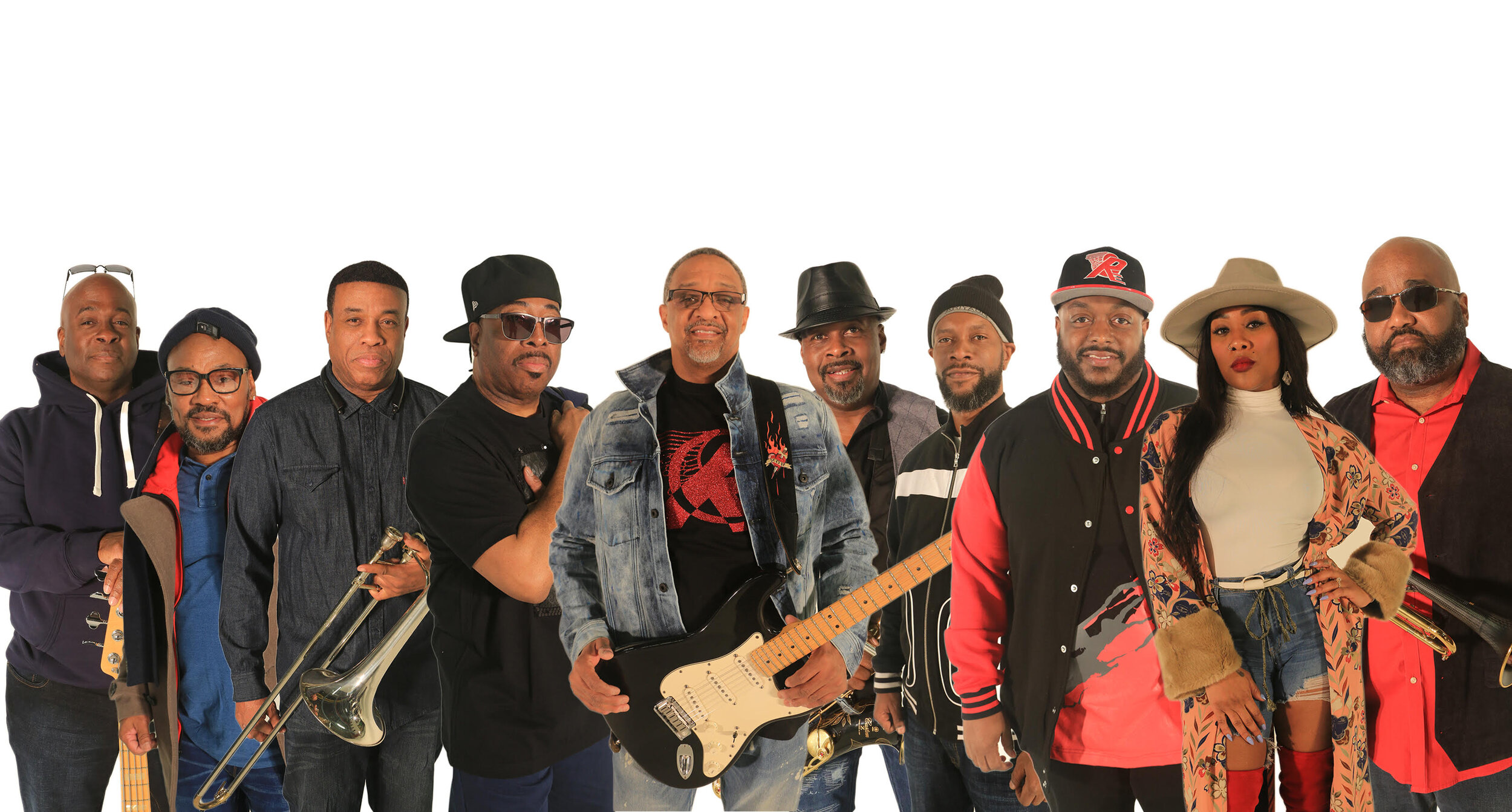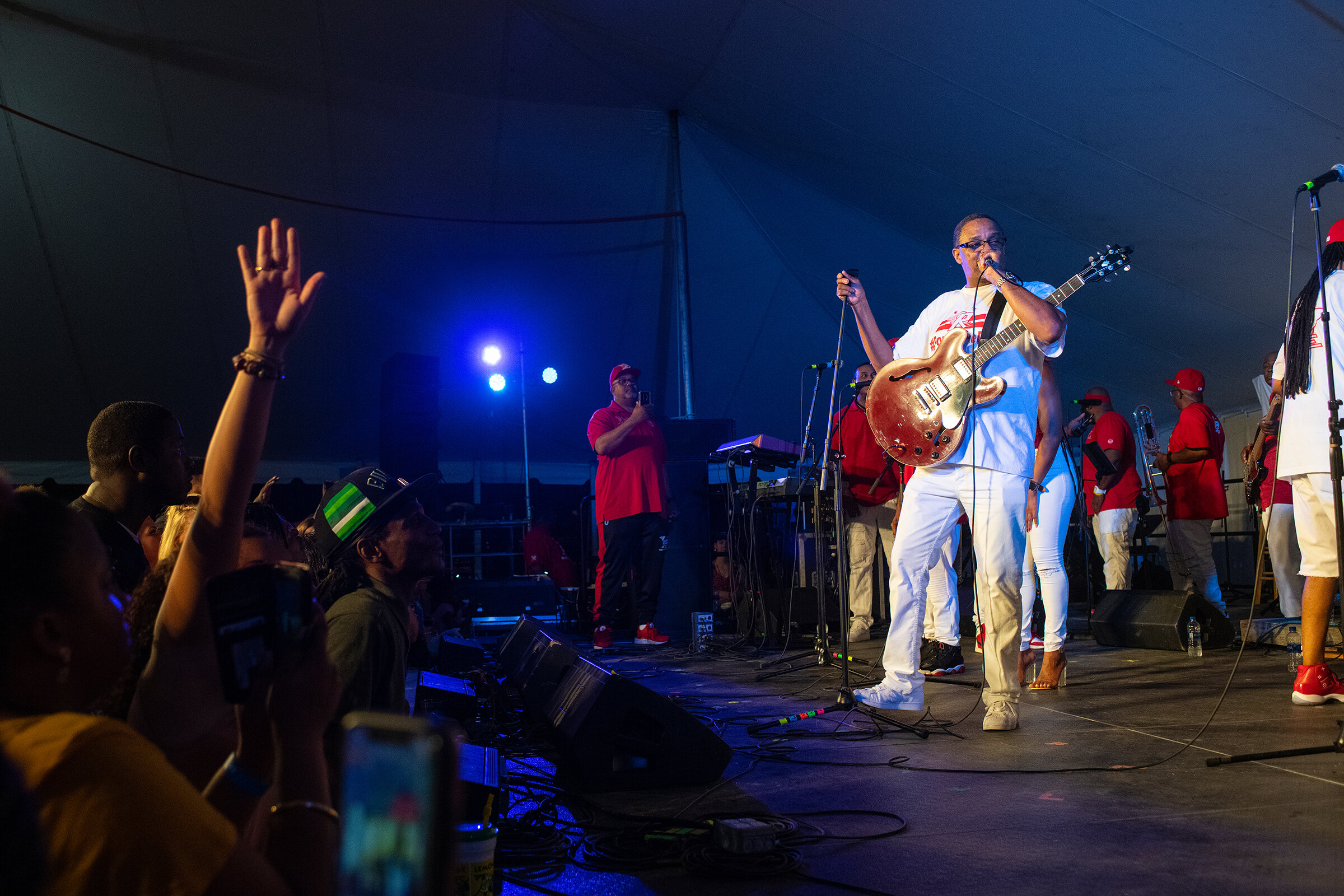By Don Harrison
When Rare Essence performed at the Richmond Folk Festival the first time, in 2010, guitarist Andre "Whiteboy" Johnson remembers that many in the band were nervous.
"Why would we be playing a folk festival?," wondered the founding member of one of Washington D.C.'s preeminent go-go ensembles, which will make a return visit in 2021. "Maybe there was another Rare Essence out there and they booked us by mistake. We thought 'folk' meant acoustic guitars and three people singing 'Kumbaya' around a microphone. But when we got to the festival and heard the other acts, and saw what it was all about, we knew we should be there. They had it 100% right."
Go-go, a distinctive urban music indigenous to Washington D.C. that originated a half-century ago, has become so synonymous with D.C. culture that, last year, Mayor Muriel Bowser and the city council named it "the official music of the District of Columbia."
"It's really a record of D.C.," Howard University professor Natalie Hopkinson told National Public Radio in 2019. She's the author of Go-Go Live: The Musical Life and Death of a Chocolate City. "It's sort of like a beautiful, interactive record. It's party music. It's soulful. People dance….You get sweaty. It's not like [a] cute, sort of pose... it's really hardcore partying."
A prime mover of this raucous sound, and one of its most consistent innovators, Rare Essence continues to attract new fans to D.C.'s party of record with a time-tested live show where the crowd helps to set the tone.
"The interaction with the audience is what makes them unique," says Nico Hobson, founder, and president of GoGo Radio LIVE / GoWin Media and acknowledged "Go-Go-Ologist." "They have a formula that they've never gotten away from, and that is to always incorporate the fans and the crowd. Outside of gospel music, go-go is probably the only other American musical genre that incorporates the audience within the music. Without the audience, there is no go-go."
Andre Johnson got his “Whiteboy” nickname because he loved to mess around with classic rock riffs at band practice.
Photo: Pat Jarrett
"The audience is definitely a part of it," says longtime frontman and vocalist James "Jas Funk" Thomas. "We have four generations of fans, and a lot of them like to be called out and for everyone to know that they are in the facility...maybe someone is having a birthday or celebrating an anniversary. When we do the call-and-response section of the show, we have a back and forth with the crowd. It's all part of the go-go feel."
Johnson breaks down the basic go-go components: "It's usually anywhere from 9-15 musicians on stage playing together with heavy percussion...drums, congos [aka, congas], cowbells, timbales, rototoms, tambourines, whistles, shakers, maracas, all of that. And then, sitting on top, is some type of funk music base or R&B and hip-hop or even rock that sort of blends in with everything else."
Rare Essence's appearance at the Richmond Folk Festival in 2010 helped to reinforce go-go as an enduring American folk tradition. Although that notion was introduced as early as 1987 when Junkyard Band performed at D.C.'s Smithsonian Folklife Festival, the idea was solidified during Richmond's National Folk Festival stint (2005-07), when in 2006 the festival featured go-go's acknowledged originator, Chuck Brown and his band the Soul Searchers. Since then, the Richmond Folk Festival has presented many of the other pioneering D.C. go-go outfits, including the bands that Hobson calls part of "the original four”: Trouble Funk, Experience Unlimited (EU), and Rare Essence.
No one disputes that it all started with the late Chuck Brown, and Rare Essence has a direct connection to the father of go-go. "Jas Funk" Thomas was working as Chuck Brown's DJ when he noticed something unique to the Soul Searchers' high-energy live shows at D.C. 's Maverick Room. "Chuck wouldn't stop the party," Thomas remembers. "Even though they didn't really coin the phrase, 'go-go,' until 1976 when Chuck started vampin' his 'Busting Loose' moves, he was playing the music long before that."
"The beat that Chuck was doing was mainly just a percussion section of the song he was about to play," Johnson recalls. "He'd add 'congos' and cowbells and all this stuff, and always said that it was his way of keeping the audience on the floor, because if you play a song and then stop, they are gonna sit down and you've got to try to get them off their seat again. If you hold them on the floor, it keeps the party going."
The guitarist says that the original Rare Essence members formally asked the godfather of go-go for permission to use his rhythm. "Chuck said 'go ahead, knock yourself out.' He was always supportive of us and the other bands that started playing the music, like Trouble Funk and EU, and we really appreciated him for that."
And there was another Brown who contributed to the feel, the members point out. "James Brown was my idol," says Thomas. "With him, it was all in the groove." Johnson maintains that go-go's feel incorporates one James Brown track in particular, 1971's “Escapism." "James is really not singing a song there but jamming with the band in the studio. That's the exact same thing that we do."
Originally called The Young Dynamos, Rare Essence was formed in Southeast D.C. by a group of St. Thomas More Catholic School students. Fueled by a love for the two Browns, Parliament-Funkadelic and Earth, Wind & Fire, the core band's first basement jams were, as Johnson recalls, "mostly noise, but then it started developing into something. Slowly but surely, we were able to form a bigger sound and add more members." One of those, Thomas, the brother of drummer Quentin "Footz" Davidson, was a few years older than the rest, and had already been working for years as a popular live disc spinner. "I knew the industry because I had been working with other bands," Thomas says. "I started out just giving them advice but ended up being the front man."
Photo: Remsburg, Inc.
Nico Hobson says that, from the beginning, the band "paved the way, and stayed in their own lane. Chuck Brown kicked it all off but Rare Essence had a truly funky go-go feel, a stylish flair." Speaking of that original four of go-go, "Chuck was more jazz go-go, Trouble Funk was percussion-laden and loud, and EU was rock-ish,” he continues. "Everyone had their own little style and RE combined all that to make the best of all worlds."
Rare Essence took Chuck Brown's prototype "pocket" and rejuvenated their vamps with hip-hop, Latin and even rock flourishes. Over the years, the group has collaborated with the likes of Doug E. Fresh, Snoop Dogg, Sean "Puffy" Combs and, most recently, Cee-Lo Green, and even hit the R&B charts in 1992 with the song, "Work the Walls." The Grammy-winning jazz-soul vocalist and bassist Meshell Ndegeocello got her start playing with the group.
And, through the years, the band has featured some of the go-go genre's most innovative players, like congo player Tyrone Williams, a.k.a. Jungle Boogie, who can be credited with changing the sound of go-go, according to Hobson. "Previously, the style wasn't heavily percussion-laden, but when he added his four congos, it gave it a Latino/soul resonance, and the other bands followed suit."
Williams, and drummer Davidson, who passed away in 1994, created a pulse that people were drawn to, says Andre Johnson. "It was a very Afrocentric style, and from that we built everything else on top." For years, that "top" was filled with the mighty sound of Anthony "Little Benny” Harley, who died in 2010. "Benny was the show," Johnson says of the pint-sized bandleader who also led another stellar go-go band, Little Benny and the Masters. "He commanded all the attention. First off, he was a short guy, and standing up there with people of normal height, you'd automatically look to see what he was doing. Then he pulled the trumpet out and you heard him play. Benny would go up and hit those high notes that we didn't hear a lot of people doing at that time. Then he'd put the trumpet down and get on the mic and his voice would be so big, you'd swear Benny was seven feet tall."
Back on stage after a year of COVID-19 hiatus, today's Rare Essence is preparing for a big 45th anniversary concert in May 2022, a milestone they were originally due to celebrate in 2020 until the pandemic hit. Planned for the MGM National Harbor in Maryland, 34 past and present members will unite for a blowout concert. "It's always exciting when the old players come back," says Thomas, who hosts a longtime Saturday morning radio program, Oldies House Party, on D.C.'s WPFW. "That night is going to be an event."
Today's Rare Essence show features a mixture of younger players and veterans, and tries to stay connected to the tastes of all ages. "They've made their front line younger and relatable to what's going on," Hobson notes. "Instead of being like some of the other bands whose music doesn't always translate to today's audience, Rare Essence always makes sure to incorporate today's music with their old set and have it be the perfect mix of both."
"We try to reach a person's inner being and make them want to be a part of it," says Thomas. "I'm constantly watching the audience, looking out to find the person who isn't moving so I can concentrate on grabbing their soul and making them get into it."
Richmond, he says, gets into it. Even before its folk festival appearance eleven years ago, Rare Essence was a popular live attraction in River City, performing in venues as varied as the Richmond Coliseum, Virginia Union University and the legendary black-owned club, Ivory's. "Richmond is like our home away from home, like our backyard."
The city has been a satellite destination for go-go, Johnson echoes. "It's a second home to us. Everytime we go down there, people know all the songs. And our return is going to be high energy. That's what people expect when they come to hear Rare Essence. It's going to be one big party the whole time we're up there on stage."




